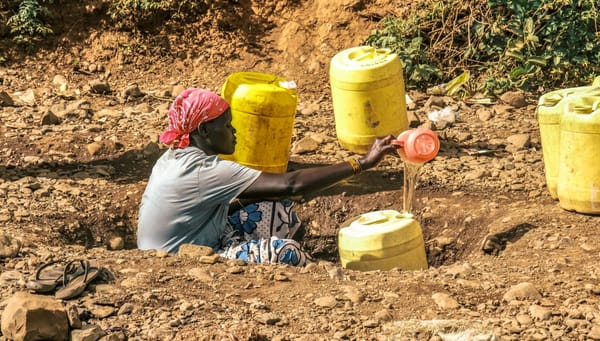The Mattei Plan: Insights and African Civil Society Critique
The Mattei Plan is a strategic partnership program launched by the Italian Prime Minister Giorgia Meloni in January 2024 at the Italy-Africa summit in Rome.

What Is The Mattei Plan?
The Mattei Plan is a strategic partnership program launched by the Italian Prime Minister Giorgia Meloni in January 2024 at the Italy-Africa summit in Rome. The plan is named after Enrico Mattei, the founder of the oil company Eni, who advocated for a development plan for African countries in the 1950s.
The plan aims to expand Italy's influence in Africa and curb illegal migration from the continent. It is seen as a significant part of Italy’s foreign policy and is expected to position Italy at the forefront of European cooperation on the African continent.
However, it has also raised some concerns among African leaders and civil society groups, who argue that it might not be as effective as intended. Some fear that it might be a neocolonialist attempt to exploit Africa's natural resources and impose Italy's interests on the continent.
Here’s what we know so far about the Mattei plan and why it raises concerns.
Funding
Italy has set up an initial budget of $5.9 billion, including credits and cooperation funds, which will be allocated to various sectors including energy, education, health, exports and infrastructure.
Approach
- Non-Predatory Approach: The Mattei Plan is framed as non-predatory for its African counterparts. It aims to foster cooperation and create strategic partnerships with African countries
- Addressing Root Causes of Migration: The plan’s main purpose is to address the root economic causes of mass migration from Africa.
- Fostering Energy Cooperation: The plan aims to enhance energy cooperation with African countries. However, there are concerns about prioritizing gas infrastructure over renewable energy.
- Shift from Reaction to Action: The Italian government aims to shift its Africa policy from reaction to action by fostering cooperation with African capitals to address long-term mutual interests.
Criticism Of The Mattei Plan
While the Mattei Plan is seen as a step towards reshaping Italy’s international status, it is also viewed as lacking in strategic foresight, historical awareness, and a comprehensive approach to dealing with African countries. Here are some of the concerns voiced by African Civil Societies and observers that highlight the complexities involved in implementing such a large-scale initiative and the need for careful planning and execution.
Lack Of Clarity and Comprehensive Strategy
The specifics of the Mattei Plan remain undisclosed, and some fear that its true nature is simply linked to the goal of curbing irregular migration to Italy. Some critics have pointed out that the plan is both ambitious, vague, and lacking a clear strategy, which could lead to implementation challenges. It is not inclusive or participatory, as it was designed without consulting African stakeholders or respecting their priorities and needs. It does not address the root causes of poverty and inequality in Africa, including corruption, governance, democracy and human rights. Also, it lacks a clear monitoring and evaluation framework, and its timeframe remains undefined, which could hamper its effectiveness and impact.
Enrico Mattei
Concerns have been voiced by some people regarding the naming of the plan in honor of Enrico Mattei, given his history as an oil magnate. While the former Italian public administrator advocated for Italy to support North African governments in the 1950s, the association of his name with the fossil fuel business might raise concerns about the intentions behind the plan, especially given the current global focus on renewable energy and sustainability. Mattei also viewed Africa as the emerging battleground between the East and the West. So many rightfully ponder— does the plan seek to foster mutual interest and equitable partnerships, or is it just another containment strategy by a Western power?
Risk Of Being Used For Political Purposes
Given the continued tussle between the East and West for Africa and its resources, and Italy’s own internal interests, there is a risk that the plan could be used for political purposes. Many people in Africa are concerned that this might influence internal balances in African nations in ways that may not always be to their advantage.
Political Instability In Some Countries
The recent coup in Niger, where the democratically elected President Mohamed Bazoum was overthrown by his own presidential guards, has created a significant challenge for the Mattei Plan. Italy has viewed Niger as a strategic outpost in the Sahel region and has over the years invested heavily into the Western Africa nation in both development aid and military presence to fight radical Islam and protect their strategic interests, including uranium mines. But these actions have contributed to rising anti-colonial sentiments among parts of the population, and acrimony within the military establishment, which ultimately led to the coup. With the Mattei Plan potentially increasing Italy’s reach in the region, these negative sentiments may grow.
Focus On Energy Supply
The plan has been criticized for its heavy reliance on natural gas. As of 2024, Italy draws around 40% of its gas from African producers. Also, the plan is driven by Italy's energy interests, especially its ambition to become an energy hub connecting Africa to Europe. Critics argue that this approach may not be sustainable in the long run, considering the global shift towards renewable energy sources. The plan could lead to increased environmental degradation at a time when the world is focused on reducing the carbon footprint. Also, it might increase conflicts over natural resources, as well as a lack of transparency and accountability in the management of energy projects.
Historic Ignorance
Decades after colonialism ended, Italy and its fellow colonial powers have failed to adequately address their colonial pasts and fulfill moral responsibilities in former colonies. There are arguments that these Western powers continued to have a negative impact on Africa long after the continent’s countries gained independence. While opinions about Neo-colonism and its continued exploitation can vary widely, the fact remains that until past atrocities are adequately addressed, many Africans will continue to hold their former colonial masters in disdain. The Mattei Plan's success may depend on the ability to build balanced relationships between Italy and African countries, which could be challenging given the historical context.
Migration Concerns
The Mattei plan is based on a quid pro quo logic, where Italy offers development aid in exchange for cooperation on migration control. This could undermine the human rights of genuine migrants and refugees, who might be forced to return to unsafe or unstable countries, or prevented from seeking asylum in Europe.
Failure To Address Corruption
The problems and challenges bedeviling Africa, including social inequality, civil strife, increased poverty, lack of basic needs such as food, water, and drugs, and insecurity often emanate from corrupt practices. Corruption is a significant issue in many African countries, and a significant obstacle to any development plan. Therefore, any efforts to help Africa grow and develop must prioritize the fight against corruption, so that the aid and funding given for projects in the region can continue to be sustained. It remains to be seen how the Mattei Plan will address this issue to enable its successful implementation.
It Could Increase Social Inequalities In Africa
If the benefits of economic expansion are not evenly distributed, the economic development under the Mattei Plan could lead to increased social inequalities within African nations. Again, its failure to address corruption means only certain segments of the population are likely to actually benefit from the economic expansion, while many are left behind. We don’t know if the Mattei Plan’s design and implementation will seek to promote inclusive growth and reduce inequality.
These are valid reasons why many critics argue that the Mattei Plan might be bad for Africa. It could jeopardize the continent’s sovereignty, dignity and development. Instead of imposing a top-down and unilateral approach, Italy should engage in a genuine dialogue and partnership with African countries, based on mutual respect, solidarity and co-responsibility.
Sources:
https://www.theguardian.com/world/2024/jan/29/meloni-to-unveil-plan-to-expand-italian-influence-in-africa
https://www.ecofinagency.com/public-management/2901-45167-italy-unveils-5-9bn-strategic-partnership-program-with-africa
https://www.globalpartnership.org/news/education-africa-takes-center-stage-italian-governments-mattei-plan




